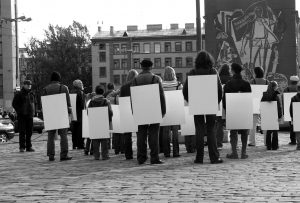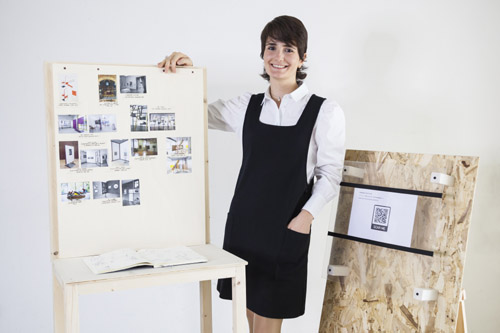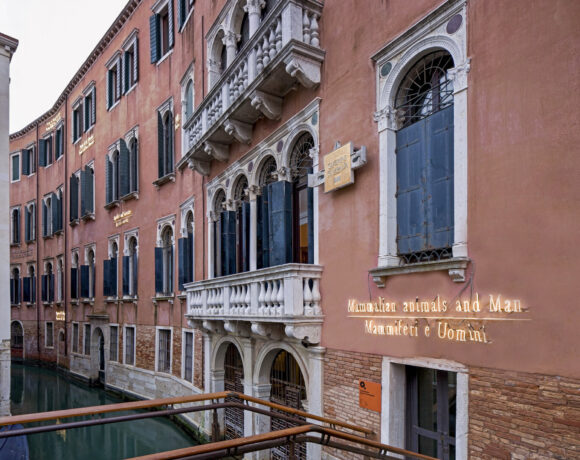“Everything ‘on display’ appears within the play of specific ways of power and exclusion, within a specific regime of enunciations: a theatre of forces, a regulatory and regulated machine of assigned roles and disciplinary codes, such is the institutional space of the exhibition”. In 2021 the second revised and updated edition of “Artecrazia. Macchine espositive e governo dei pubblici” by Marco Scotini is published. Consistently with the attention to the economic and financial processes of globalisation with which DeriveApprodi has been providing, since 1998, a critical reading on the issues of the present. Marco Scotini, the book’s author, is art director of FM Centro per l’Arte Contemporanea, Milano and curator of the public program of PAV, Parco Arte Vivente, Torino, and he is also director of Archivio Gianni Colombo and of Archivio Bert Theis. In his critical and curatorial activity, as well as in teaching and directing the NABA Department of Visual Arts in Milan and Rome, emerges a research that, through different vectors of criticism such as ecology, decoloniality and gender, aims to deconstruct the rhetoric and ideological mystifications of modernity that involve artistic production and curatorial policies.
The introduction to the latest edition anticipates Christian Marazzi’s preface and leads to the four sections (Exhibitions, Audiences, Screens, Stories) in which unfolds an institutional critique, conducted in the first person, pointing the finger at the neo-liberal governance of the contemporary art system, with respect to the mechanisms and strategies that justify forms of legitimisation and naturalisation commited within the artecracy.“Artecrazia” (Artecracy) is the neologism coined by the author to punctually denounce the economic, institutional and political rule of a small number of elite representatives, which guarantees the normalisation and codification of the space of culture, in parallel with the establishment of the neo-liberal regime.
In the first part of the book, the cultural device of the exposition is plunged into the heart of the critique of pre-established hierarchies and neo-liberal corporate hegemonies which, not limiting themselves to the economic and administrative field, invest the critical sectors of cultural, moral, ethical and intellectual leadership.Through the poetics of the Austrian artist Peter Friedl, the reasoning continues on the internal dynamics of the contemporary exhibition machinery, allowing the establishment of valuable dialogues with Charles Esche, Harald Szeemann and Li Xianting. Faced with manifestations of “circumscribed spaces of tolerated and controlled freedom” under the creative industry and the financial regime, Scotini concludes by reporting on the experience of Isola Art Center, denouncing the need to conceive art as job.
In the following section he further affirms the need to overcome the old institutional critique in favour of a socio-laborist point of view within the current cognitive economy. The second part of the book examines the complementarity between Vaccari’s and Iveković’s practices, up to the interview with Paolo Virno, ending with the question: “How is it still possible to re-appropriate the knowledge (as a complex of attitudes, of forms of human life) that has been and is continually being expropriated from us?”. Guy Debord, Alberto Grifi, Oliver Ressler, Clemens von Wedemeyer, Deimantas Narkevičius, Armando Lulaj are the subjects of the essays that flow into the third part of the book, which closes with Gaia Casagrande’s interview with the author. The dialogue focuses on the video-archive “Disobedience”, conceived and curated by Marco Scotini, with the direct collaboration of activists, artists and filmmakers. Since 2004, the project has been exhibited in major international museums.
The new edition is completed with three essays on: non-aligned modernity in the ex-Yugoslavia, the rebellious archives of Italian feminism in the 1970s, ecology as a nomadic science. Reopening the archives, for Scotini, has a fundamental epistemological meaning that includes both the recognition of the role of plural histories that modernity has erased from official narratives, and the implementation of another method of investigating the past. It is necessary to examine the historical experiences that have been left out in respect to the centrality of a monolithic western historicism and to denounce all forms of neoliberal capture which underlies the emptying of subversive potential of all instances of claims that move in the sphere of gender, race, ecology.
Since the first edition in 2016, Scotini has been analyzing the techniques of governance of artecracy and the possible subtractions from its regime, providing all the tools to carry out an examination of the phenomenon of the capitalist valorization of creativity and cultural production in the post-Fordist era, in which language, relational attitudes, cognitive activities and communication are exploited, generating precariousness and new forms of alienation. In the decision to make a second edition, five years later, with the integration of elements in support of the decentralization of the modernist subject, there is a desire to denounce an implicit systemic continuity pre- and post-emergency and draw attention to the constant subjugation of artistic production to the autocracy of capital.
 Angry Sandwichpeople, Chto delat/What is to be done? 2005. Courtesy Chto delat?
Angry Sandwichpeople, Chto delat/What is to be done? 2005. Courtesy Chto delat?
 FM Centro Arte Contemporanea, Il soggetto imprevisto. 1978 Arte e Femminismo in Italia, 2019. Exhibition view con opere di Lisetta Carmi e Paola Agosti. Courtesy delle artiste e FM Centro Arte Contemporanea, Milano
FM Centro Arte Contemporanea, Il soggetto imprevisto. 1978 Arte e Femminismo in Italia, 2019. Exhibition view con opere di Lisetta Carmi e Paola Agosti. Courtesy delle artiste e FM Centro Arte Contemporanea, Milano
 Igor Grubic’, 366 Rituals of Liberation, 2008. Courtesy dell’artista e Galleria Laveronica
Igor Grubic’, 366 Rituals of Liberation, 2008. Courtesy dell’artista e Galleria Laveronica

In 2019 she obtained a BA Degree in Painting and Visual Arts at NABA (Milan), where she is finishing her MA degree in Visual Arts and Curatorial Studies. Since last years she has been collaborating with cultural realities outside the major centres. As curator she is involved in the realization of multidisciplinary projects aimed at heterogeneous audiences.






NO COMMENT